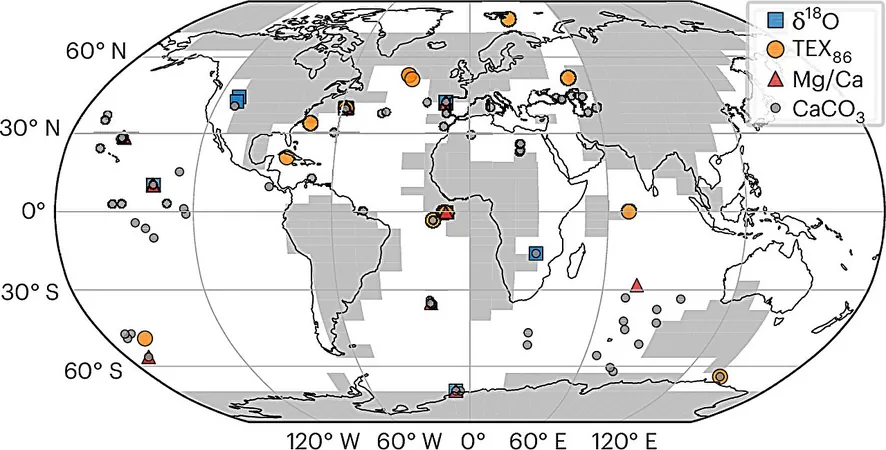
Shocking New Study Reveals Ancient Ocean Acidification as Parallel to Today’s Climate Crisis!
2024-11-15
Author: Sarah
A Groundbreaking Study by Prof. Li Mingsong
A groundbreaking study led by Prof. Li Mingsong at Peking University has uncovered alarming insights into the Paleocene-Eocene Thermal Maximum (PETM)—a pivotal event that dramatically altered ocean chemistry and could serve as a stark warning for today’s climate challenges.
Published Research in Nature Geoscience
Published in the prestigious journal *Nature Geoscience*, the research, titled "Coupled decline in ocean pH and carbonate saturation during the Palaeocene–Eocene Thermal Maximum," meticulously reconstructs the ocean acidification that occurred 56 million years ago. This ancient event was marked by an unprecedented release of carbon dioxide, which rapidly escalated global warming and transformed marine ecosystems. The researchers emphasize that understanding these historical trends is crucial in addressing the pressing issues linked to modern human-driven CO2 emissions.
The PETM and Its Analogies to Modern Climate Change
The PETM serves as an eerie reflection of contemporary climate change, particularly its implications for acidification in fragile ocean environments. During this ancient episode, atmospheric CO2 levels skyrocketed from 890 parts per million (ppm) to an astonishing 1980 ppm. The study elucidates that acidification effects were most pronounced in high-latitude regions, mirroring current declines in aragonite saturation observed today, especially in the vulnerable Arctic.
Advanced Research Techniques
The research employed advanced methods of paleoclimate data assimilation, effectively combining proxy data with Earth system model simulations to recreate the ancient ocean’s carbonate chemistry. The findings reveal that the ocean's pH plummeted by 0.46 units—from a relatively stable 7.91 to an alarming 7.45—leading to catastrophic disruptions in marine life. In fact, this significant acidification event contributed to the extinction of 30% to 50% of benthic foraminifera, a key group in the marine food chain, alongside a substantial decline in biodiversity.
Urgency of Action on Carbon Emissions
This research underscores the urgency of action regarding carbon emissions today, as similar patterns of ocean acidification threaten marine ecosystems, particularly in the Arctic, which is facing unprecedented changes. Scientists warn that if action is not taken to mitigate carbon emissions, we may be heading toward another mass extinction event, echoing the devastating consequences of the PETM.
A Call to Arms for Policymakers and Public
As the world grapples with rising CO2 levels, this study shines a light on how our current trajectory could repeat the errors of the past. It’s a clear call to arms for policymakers, environmental advocates, and the general public to prioritize strategies that combat anthropogenic carbon emissions and protect our oceans before it's too late!


 Brasil (PT)
Brasil (PT)
 Canada (EN)
Canada (EN)
 Chile (ES)
Chile (ES)
 España (ES)
España (ES)
 France (FR)
France (FR)
 Hong Kong (EN)
Hong Kong (EN)
 Italia (IT)
Italia (IT)
 日本 (JA)
日本 (JA)
 Magyarország (HU)
Magyarország (HU)
 Norge (NO)
Norge (NO)
 Polska (PL)
Polska (PL)
 Schweiz (DE)
Schweiz (DE)
 Singapore (EN)
Singapore (EN)
 Sverige (SV)
Sverige (SV)
 Suomi (FI)
Suomi (FI)
 Türkiye (TR)
Türkiye (TR)